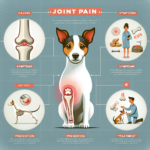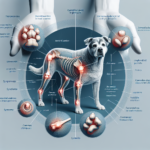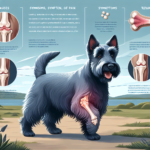Rat Terrier Joint Pain: Causes, Symptoms, Prevention, and Treatment

Introduction
The Rat Terrier is a small to medium-sized breed known for its agility, intelligence, and energetic nature. Originating in the United States, this breed was initially developed for hunting and farm work, particularly for controlling vermin populations. Rat Terriers are characterized by their muscular build, alert expression, and short, smooth coat. They are highly trainable and make excellent companions for active families.
Like many breeds, Rat Terriers are prone to certain health issues, including joint pain. Joint health is crucial for maintaining the breed’s active lifestyle and overall well-being. Understanding the causes, symptoms, prevention, and treatment of joint pain in Rat Terriers can help owners ensure their pets lead a comfortable and active life.
Breed-Specific Joint Pain Risks
Genetic Predisposition
Rat Terriers, like many other breeds, can be genetically predisposed to joint-related issues. Common conditions include hip dysplasia, arthritis, and elbow dysplasia. Hip dysplasia occurs when the hip joint does not fit properly into the hip socket, leading to pain and mobility issues. Arthritis, a degenerative joint disease, can cause chronic pain and stiffness. Elbow dysplasia involves abnormal development of the elbow joint, leading to lameness and discomfort.
Age-Related Risks
As Rat Terriers age, the risk of developing joint pain increases. Senior dogs are more susceptible to arthritis and other degenerative joint conditions. Owners should be vigilant about monitoring their Rat Terrier’s joint health as they approach middle age, typically around 7-8 years old. Early detection and intervention can significantly improve the quality of life for aging dogs.
Activity Level and Joint Stress
Rat Terriers are known for their high energy levels and love for physical activities such as running, jumping, and playing. While regular exercise is essential for their overall health, excessive or high-impact activities can put stress on their joints. Owners should balance their dog’s activity levels to prevent overexertion and potential joint damage.
Common Symptoms of Joint Pain in Rat Terriers
General Symptoms
- Limping or favoring one leg
- Stiffness, especially after rest or sleep
- Reluctance to move, jump, or climb stairs
- Decreased activity or playfulness
- Visible discomfort or pain when touched
- Swelling around the joints
Breed-Specific Symptoms
In Rat Terriers, joint pain may manifest as a reluctance to engage in activities they once enjoyed, such as chasing toys or running. They may also exhibit changes in behavior, such as increased irritability or withdrawal from social interactions. Owners should be attentive to these subtle changes, as they can indicate underlying joint issues.
When to Consult a Vet
If a Rat Terrier shows any signs of joint pain, it is essential to consult a veterinarian promptly. Early diagnosis and treatment can prevent the condition from worsening and improve the dog’s quality of life. Persistent limping, noticeable pain, or significant changes in behavior should be addressed by a professional.
Preventive Measures for Joint Health
Exercise Recommendations
Regular, moderate exercise is crucial for maintaining joint health in Rat Terriers. Activities such as walking, swimming, and gentle play can help keep their joints flexible and muscles strong. Avoid high-impact exercises like excessive jumping or running on hard surfaces, as these can exacerbate joint stress.
Dietary Suggestions
A balanced diet rich in essential nutrients can support joint health. Foods containing glucosamine, chondroitin, and omega-3 fatty acids are particularly beneficial. These nutrients help maintain cartilage health and reduce inflammation. Owners may also consider joint supplements, but it is advisable to consult a veterinarian before adding any new supplements to the dog’s diet.
Weight Management
Maintaining a healthy weight is vital for reducing joint stress in Rat Terriers. Excess weight can put additional pressure on the joints, leading to pain and mobility issues. Owners should monitor their dog’s weight and adjust their diet and exercise routine as needed to prevent obesity.
Early Screening and Monitoring
Regular veterinary check-ups and early screening for joint issues can help detect problems before they become severe. Vets may recommend X-rays or other diagnostic tests to assess joint health. Early intervention can include lifestyle changes, medications, or other treatments to manage joint pain effectively.
Treatment Options for Joint Pain
Non-Surgical Treatments
Non-surgical treatments for joint pain in Rat Terriers include medications, physical therapy, and lifestyle adjustments. Anti-inflammatory drugs and pain relievers can help manage symptoms. Physical therapy, including exercises and massage, can improve joint mobility and reduce pain. Lifestyle adjustments, such as providing a comfortable bed and avoiding high-impact activities, can also alleviate joint stress.
Surgical Options
In severe cases, surgical intervention may be necessary. Common surgeries for joint pain include hip replacement, arthroscopy, and joint fusion. These procedures can significantly improve mobility and reduce pain. However, surgery should be considered a last resort after exploring all non-surgical options.
Alternative Therapies
Alternative treatments such as acupuncture, hydrotherapy, and massage can provide additional relief for joint pain. Acupuncture involves inserting thin needles into specific points on the body to reduce pain and inflammation. Hydrotherapy, or water therapy, allows dogs to exercise without putting stress on their joints. Massage can improve circulation and reduce muscle tension around the joints.
Lifestyle and Management Tips
Daily Care Routine
A daily care routine for managing joint pain in Rat Terriers should include gentle exercise, a balanced diet, and regular monitoring of symptoms. Owners should provide a comfortable sleeping area and avoid activities that may strain the joints. Consistent care and attention can help manage pain and improve the dog’s quality of life.
Modifying the Home Environment
Making the home environment more comfortable for a dog with joint pain can significantly improve their well-being. Consider using ramps instead of stairs, providing orthopedic beds, and ensuring that food and water bowls are easily accessible. These modifications can reduce joint stress and make daily activities more manageable.
Long-Term Management
Long-term management of joint pain involves ongoing care and monitoring. Regular veterinary check-ups, a consistent exercise routine, and a balanced diet are essential. Owners should also be prepared to adjust their care strategies as the dog’s condition changes over time. With proper management, Rat Terriers can continue to lead active and fulfilling lives despite joint pain.
FAQs About Rat Terriers and Joint Pain
What are the early signs of joint pain in Rat Terriers?
Early signs of joint pain include limping, stiffness, reluctance to move, and changes in behavior. Owners should watch for these symptoms and consult a veterinarian if they notice any concerning changes.
Can joint pain in Rat Terriers be prevented?
While it may not be possible to prevent joint pain entirely, owners can take steps to reduce the risk. Regular exercise, a balanced diet, weight management, and early screening can help maintain joint health and prevent severe issues.
Are there specific exercises that are better for Rat Terriers with joint pain?
Low-impact exercises such as walking, swimming, and gentle play are ideal for Rat Terriers with joint pain. These activities help maintain joint flexibility and muscle strength without putting excessive stress on the joints.
What dietary supplements can support joint health in Rat Terriers?
Supplements containing glucosamine, chondroitin, and omega-3 fatty acids can support joint health. These nutrients help maintain cartilage health and reduce inflammation. Always consult a veterinarian before adding new supplements to your dog’s diet.
When should I consider surgery for my Rat Terrier’s joint pain?
Surgery should be considered a last resort after exploring all non-surgical options. If your dog experiences severe pain or mobility issues that do not respond to other treatments, consult a veterinarian to discuss potential surgical interventions.
Conclusion
Joint pain is a common concern for Rat Terriers, but with proper care and attention, owners can help their pets lead comfortable and active lives. Understanding the causes, symptoms, prevention, and treatment options for joint pain is essential for maintaining the breed’s overall health and well-being. By taking preventive measures, monitoring symptoms, and consulting with veterinarians, owners can ensure their Rat Terriers enjoy a high quality of life despite joint challenges.




